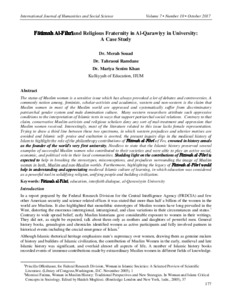Merah, Souad and Tahraoui, Ramdane and Khan, Mariya Seemin
(2017)
Fātimah Al-Fihrīand religious fraternity in Al-Qarawiyy in University: a case study.
International Journal of Humanities and Social Science, 7 (10).
pp. 177-183.
ISSN 2220-8488
E-ISSN 2221-0989
![[img]](http://irep.iium.edu.my/60386/1.hassmallThumbnailVersion/F%C4%81timah%20Al-Fihr%C4%ABand%20Religious%20Fraternity%20in%20Al-Qarawiyy%20in%20University.pdf)  Preview |
|
PDF (This article digs in the medieval history of Islam to highlight the role of the philanthropy contributions of Fātimah al-Fihrī of Fes, crowned in history annals as the founder of the world's very first university.)
- Published Version
Download (217kB)
| Preview
|
Abstract
The status of Muslim women is a sensitive issue which has always provoked a lot of debates and controversies. A commonly notion among, feminists, scholar-activists and academics, western and non-western is the claim that Muslim women in most of the Muslim world are oppressed and systematically suffer from discriminatory patriarchal gender system and male domination culture. Many western researchers attribute such oppressive conditions to the interpretation of Islamic texts in ways that support patriarchal social relations. Contrary to that claim, conservative Muslim activists and religious scholars deny any sort of mal-treatment and oppression that Muslim women received. Interestingly, most of the literature related to this issue lacks female representation. Trying to draw a third line between these two spectrums, in which western prejudices and ulterior motives are avoided and Islamic self- praise and exaltation is averted, the present inquiry digs in the medieval history of Islam to highlight the role of the philanthropy contributions of Fātimah al-Fihrī of Fes, crowned in history annals as the founder of the world's very first university. Needless to state that the Islamic history preserved several examples of successful Muslim women who contributed to their societies and were able to play an active social, economic, and political role in their local communities. Shedding light on the contributions of Fātimah al-Fihrī is expected to help in breaking the stereotypes, misconceptions, and prejudices surrounding the image of Muslim women in both, Muslim and non-Muslim worlds. Furthermore, highlighting the legacy of Fātimah al-Fihrī would help in understanding and appreciating medieval Islamic culture of learning, in which education was considered as a powerful tool in solidifying religion, unifying people and building civilization.
Actions (login required)
 |
View Item |


 Download Statistics
Download Statistics Download Statistics
Download Statistics